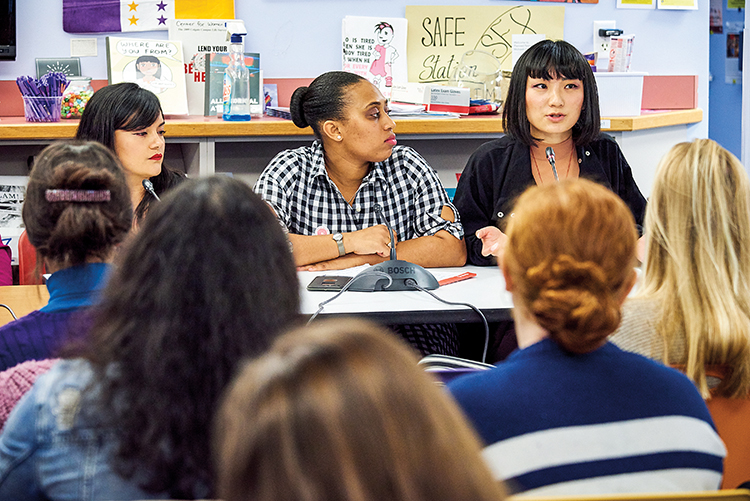The women’s studies center celebrates 25 years
In the Center for Women’s Studies, postcards detailing the center’s impact decorate the room’s pillars. Written by students and alumni, they express the authors’ appreciation for a space that made them feel safe and changed their lives.
This postcard initiative was part of a semester-long series of events in honor of the center’s 25th anniversary.
“The women’s studies center is the place I was able to find my voice,” said Dena Robinson ’12 during a Nov. 5 brown bag panel.
Robinson was joined by panelists Sarah Sillin ’05, Gabriella Jones-Casey ’09, Emily Ha ’09, Poppy Liu ’13, and Tess Cumpstone ’15. Dominique Hill ’05, the A. Lindsay O’Connor Chair of American Institutions, moderated the event. The alumnae addressed the changes they fought for while on campus as well as how the lessons they learned through women’s studies shaped their personal and professional lives.
Many of the women spoke on the duality of their undergraduate years: time split between the empowering and accepting women’s studies community and time spent at an institution that was, in some ways, hostile to their identities.
They spoke of their gratitude for the reprieve East Hall’s basement provided as they grappled with queer and minority identities as well as learned to navigate privilege on a predominantly heterosexual, white campus.
“A lot of my journey at Colgate was being able to step into the fact that I do deserve to be here,” Robinson said.
The alumnae attributed women’s studies with giving them the language to understand and express their feelings, in addition to providing a safe space and sense of community.
For Ha, a first-generation college student and young mother at Colgate, these attributes proved vital. “It’s not an exaggeration when I say the women’s studies center saved my life,” she said.
As undergraduates, the women organized and tackled issues ranging from racism to rape culture, preparing them for careers as feminist scholars, community organizers, authors, and activists. They emphasized their desire to sustain the center and give back to students.
“You have a lot of power, and you can change environments through collective action,” Jones-Casey told students.
Later in the week, an evening reception took place. Susan Thomson, director of women’s studies and associate professor of peace and conflict studies, thanked those who helped shape the center — from current and former students, to center interns, to previous directors and professors. She then invited key members of the community and advisory board to speak.
Associate Dean of the Faculty Lesleigh Cushing read from one of the center’s first newsletters, in which community members wrote about creating the center, then located in 113 Broad Street.
“There’s this idea of being built in existing spaces: carving out spaces for women with the strength and energy and foresight of the women who brought in the furniture and painted,” she said. “[The center] is a real beating heart of this campus. It is a psychic, spiritual, and physical home for so many of us.”
In addition to these events, a social media campaign united those on campus with others reminiscing from afar through: highlighting student clubs; flashing back to issues of the center’s magazine, Allegorical Athena; and spotlighting historical moments such as the center’s grand opening and previous brown bag speakers.
The anniversary events were made possible in part through the generosity of Katie ’01 and Tal-ee Roberts ’01, and Robert Chamberlain ’74 and family, in memory of Rita Chamberlain ’75.

